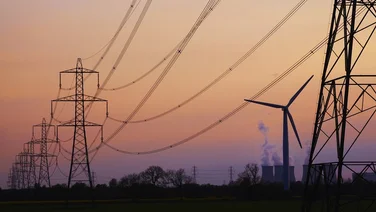- Over the past 10 years, the UK has become less reliant on imported fuels to generate its electricity
- The deployment of more renewables will continue to improve our energy security
- In 2024, gas accounted for around 30% of the UK’s electricity supply
The UK’s electricity supply has “become more British” over the past decade as the UK has become less reliant on importing fuels thanks to the rapid expansion of solar and wind power, according to new analysis from the Energy and Climate Intelligence Unit (ECIU).
Dr Simon Cran-McGreehin, head of analysis, ECIU said that compared to 2014, when around 65% of the energy used for UK electricity generation was dependent on foreign fuels, in 2024, just under 50% of our electricity supply relied on net imports of energy.
He added that in future, the deployment of more renewables will continue to improve our energy security, even with electricity demand rising as customers switch to electric vehicles (EV) and heat pumps.

The role of North Sea gas will play an ever-smaller role as production declines, which is the case irrespective of any new licences.
“UK electricity is becoming more British and this is the net zero emissions target in action, decreasing our demand for foreign gas by boosting homegrown renewables,” Cran-McGreehin explained.
“Gas output from the North Sea has been falling for decades, but British renewables, like offshore wind, are stepping in to help generate more British electricity”.
Cran-McGreehin went on to say that figures show renewables will have to “do the heavy lifting” to make the UK energy secure and protect household bills from “geopolitics around energy and actors like Putin”.
In 2024, gas accounted for around 30% of the UK’s electricity supply, but set the price of electricity 97% of the time, the highest proportion in Europe.
Cran-McGreehin added that renewables reduce the amount of gas generation that is needed, and so reduce the amount of imported fuel. He also said that new renewables also help to reduce the price impact of gas via the Contracts for Difference scheme, where they pay back consumers at times of high gas prices and receive small payments where gas prices are lower.
“Last year, the Energy Crisis Commission found that the UK remains dangerously unprepared for another energy crisis because of its over-reliance on gas and the International Monetary Fund found that the UK was the worst hit in Western Europe by the crisis because of its dependency on gas for heating and electricity generation,” he said.
The Government has a goal to reach net zero by 2050, which means phasing out the use of gas for electricity generation, while keeping a ‘strategic reserve’ of gas plants for back-up, but a policy gap remains around transitioning home heating away from the fuel, as well as for the mass insulation of UK homes.
Currently, projections by the regulator on industry data suggest that gas production is predicted to drop by 95% by 2050 with new licenses and by 97% without new licenses, so there’s little difference in production regardless of the government’s position on new licensing.






